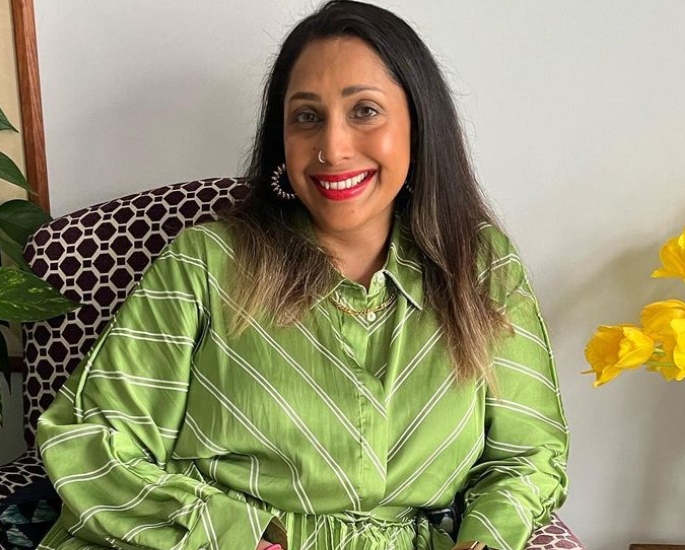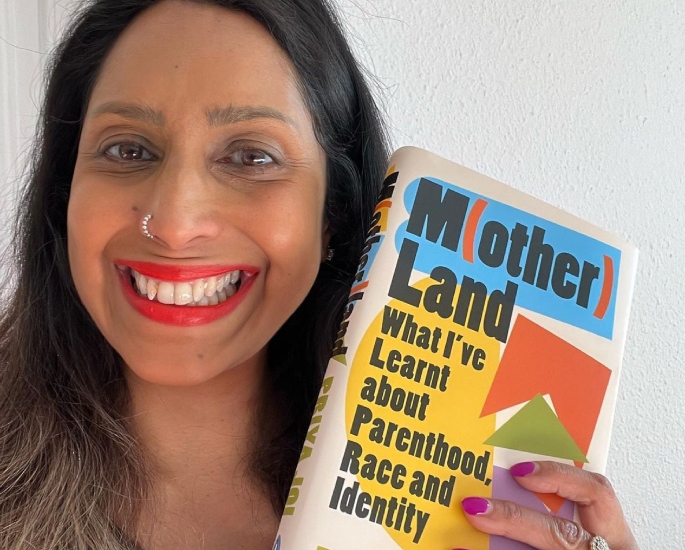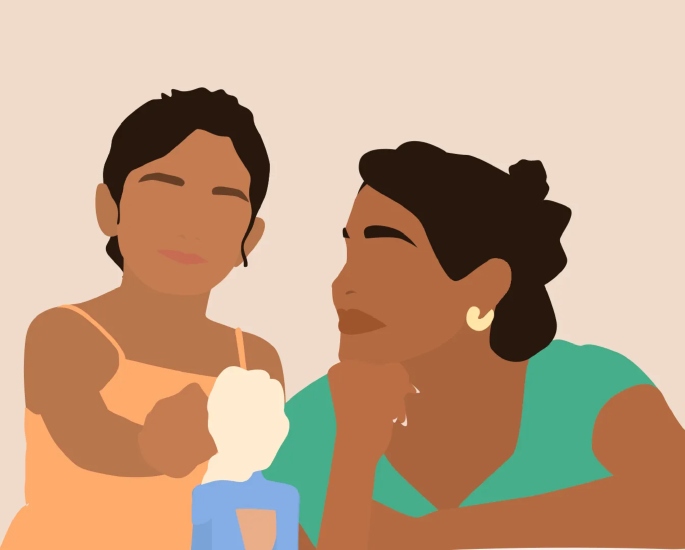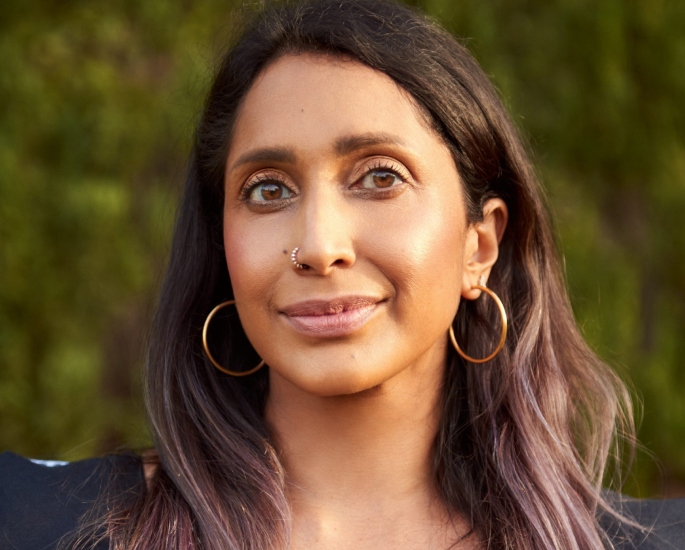"I'm not hiding behind a character, this is all me"
Prepare to be captivated by the extraordinary journey of Priya Joi, a highly esteemed science journalist who has published her debut novel, M(other)land.
Not confined to traditional outlets, Priya’s dynamic storytelling prowess has graced the pages of The Guardian, BBC, and Médecins Sans Frontières.
Yet, Joi’s impact goes beyond the realms of science alone, as she fearlessly shines a light on the pervasive issues of race, sexism, and discrimination throughout her illustrious career.
These are some of the elements she touches on in M(other)land, which she proclaims as being her memoir on motherhood, race and identity.
The groundbreaking debut offers a profound exploration of the human experience, delving into the intersection of science, culture, and society.
With her unparalleled expertise and unyielding dedication to justice, Priya’s voice reverberates through the pages, leaving an indelible mark on every reader.
With eloquence and conviction, she explores the profound impact intersecting realms have on her role as a parent and step-parent, proudly embracing her (British-Indian) heritage.
This empowering book stands as Priya’s clever response to the glaring absence of an inclusive and accessible roadmap for navigating the complexities of being a multi-faceted mother.
We spoke to the esteemed writer so she could shed more light on the novel, her views on identity, and the changing diversity of literature.
How did your love for writing come about?

I went to live on the other side of the world away from my family twice as a child, so books helped fill the immense gap.
When I missed the UK, I read British authors, when I tried to make sense of India, I read Indian authors.
When I wanted to elevate myself from all of it, I read books that helped me escape into my own little worlds.
It made sense for me to write to bring other people into my world.
Are there any authors that have inspired the way you write?
My favourite authors range from Salman Rushdie and Arundhati Roy to Iain M Banks and Donna Tartt.
“But when I got the chance from Penguin to write my own story, I made a point to write in my own way.”
The idea that I will pour my heart out over deeply personal matters while pretending to be someone else was unimaginable.
As a writer, how do you mould your experiences into stories?

I work from home, so it was quite a challenge to step out of work and mother mode to put on my creative hat.
But I set aside dedicated time to commit all the thoughts swimming around my head onto paper.
Luckily, M(other)land is all about my child, so having her buzz around while I was writing was more an inspiration than a botheration.
It helped that she’s forever saying quotable things!
Where did the idea for ‘M(other)land’ come from?
When I became a mother in my late 30s, quite late for an Asian woman, I read a ton of books about motherhood.
They were either penned by white yummy mummies cracking jokes about drinking Prosecco between feeds, or ones by women of colour that focussed on the race element.
“I wanted to write a book that was neither fluffy nor angry.”
I wanted to make it relatable and hopefully amusing for any mother, especially ones that hop between identities.
Can you tell us the importance of sharing such a story?

This book is primarily for parents of brown or mixed-race children, especially ones raising those kids in a predominantly white place.
My daughter has grown up in France and Spain and has only now started to have brown friends, so her questions about race have been quite unique.
I didn’t want to write the book as some kind of “how-to”.
But I think there’ll be stories that may well help mothers figure out what to say when children innocently wonder how their skin colour makes them different.
What challenges did you have when writing the book?
The biggest one was “how personal do I get?”.
I’m not hiding behind a character, this is all me laid bare, literally hanging my wares for all to see.
“I tried my best not to whitewash over the murky bits.”
But when it came to things about, say, my mother…I had to put my editor’s hat on.
Yes, a memoir should be honest, but there’s nothing in the rulebook that says you have to destroy relationships in telling your truth.
How did you bridge the gap between your past and upbringing?

I think we all find our bridge.
Some move on by burning a few bridges, others build a few, but ultimately, we all started out in a very Asian place and made our way in a very British one.
Whether we look back or find it hard to move forward, we can’t discount the journey that brought us here.
Don’t try and be British or South Asian. Be both.
Take the aspects of the Asian identity you feel comfortable in, the aspects of the western culture you revel in.
Being yourself isn’t a blueprint anyone can set out for you. Pick and mix what works for you.
Being a South Asian author, was it harder to get published?
Well, in this instance, given the story is very much about an Indian Brit making sense of her two worlds, it would have to be written by a South Asian.
We have to count ourselves lucky that there’s a lot of interest in our history and way of life that still holds a fascination for the white, liberal-minded British reader.
“The trick is not to patronise non-Asians, nor to rehash the same tired old cliches for Asian readers.”
Saying that, Indian writers have been a prominent feature in the Booker Prize for some time now.
And, British Asian authors have moved on from trying to emulate them by writing those novels set over three generations.
More Asian authors are now presenting themselves simply as authors, and not necessarily spokespeople for the Asian community.
Has the literary landscape become more diverse?

Absolutely. Even 10 or so years ago, my Asian writer friends were complaining that agents wanted to change brown characters to white ones.
Or, to have brown characters portrayed as victims rather than just normal people on some strange adventure.
Now, it’s perfectly normal to have a protagonist or leading character who happens to be Asian, with no mention of arranged marriages or racism to justify their place in the book.
It’s refreshing to hear just how much more diverse the literary industry is becoming for South Asians.
It means that more stories like M(other)land can reach more audiences, both Asian and non-Asian.
M(other)land emerges as an indispensable literary companion, offering invaluable guidance to those embarking on the intricate journey of race and motherhood.
It speaks directly to individuals who have experienced the burden of feeling like an outsider.
Priya imparts a wealth of hard-earned wisdom, accumulated over years of personal growth and introspection.
One of the profound insights she imparts is that the complexity of one’s identity is not a source of conflict but rather an integral part of who they are.
The novel encourages liberation and reflection without hampering one’s own personal journey.
Don’t miss out on this incredible memoir. Grab a copy of M(other)land here.






























































